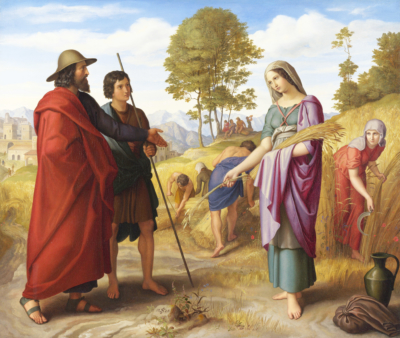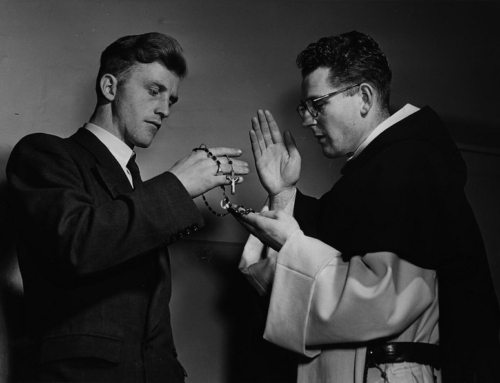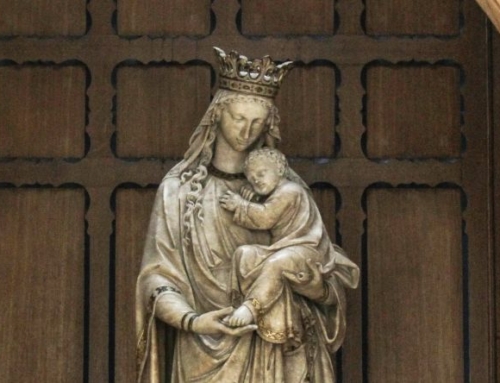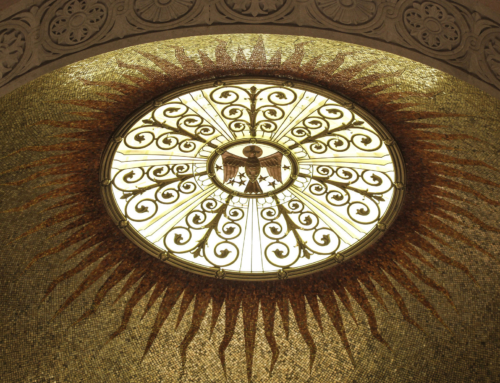In the notes to his collection of poems entitled West-Östlichen Divan, Johann Wolfgang von Goethe somewhat famously described the Book of Ruth as “the most charming, little narrative handed down to us as epic and idyllic.” The description, at least initially, seems apt enough. Many people remember this short work of the Bible as the heartwarming story of a young, foreign woman who enters into the nation of Israel as the result of her loving fidelity for her mother-in-law and for her mother-in-law’s God—the God of Abraham, Isaac, and Jacob.
Yet, memories can be misleading.
As one innocently turns to the opening verses of the narrative, the illusion immediately begins to fade. In those lines, tragedy unfolds at a breathtaking pace: famine, desertion, and death all figure prominently in the first chapter.
Nevertheless, if death and despair dominate the literary landscape of the opening verses, the book concludes on more upbeat notes of life and love. While the story of Ruth and her mother-in-law, Naomi, may contain more sorrow than most readers remember, it remains a story of faithfulness and hope.
I Asked You for Life, and This You Have Given
The Book of Ruth has a strong fairytale-like quality to it. The book opens by filling in some background material: there had been a famine in the land of Israel; a particular family had left Bethlehem and settled in Moab in search of a better life; and at the end of ten years, all of the men of the family had died. The book then goes on to tell how two of the remaining members of this family return to Bethlehem. Naomi, the matriarch of that family, leaves Moab with one of her daughters-in-law, Ruth, with nothing more than the hope of living off of the charity of her fellow Israelites. By the end of the story, both of these women enjoy the abundant blessings of the land and people of God.
This movement from hope to fulfillment is not limited to the lives of these two women. It is also mirrored in the story of the land. The name Bethlehem means “House of Bread” in Hebrew—a rather ironic name for a town suffering from a famine. At the start of the book, Bethlehem does not sustain life as much as its name suggests, pointing to a frustrated desire for life throughout the entire land—not just in the lives of Ruth and Naomi.
Life, then, is the aim of the narrative arc in the Book of Ruth. And, in this respect, the story has a happy ending. God visits his people, giving them bread, and God also makes Ruth fruitful, granting her a son, Obed. Moreover, as the mirroring of the narrative arc in nature suggests, the story of Ruth concerns not just the life of a single family, but of an entire nation. The entire land yearns for the vital favor of God, which will be fully realized in Ruth’s great-grandson who will be a king—and not just any king, but the king: King David. Therefore, the fairytale-like happy ending of the Book of Ruth touches the lives of the countless people through the ages who have viewed David and his offspring as heirs of the special, life-giving promise of God.
What Profit Is There in My Death, My Going to the Grave?
But, the story of Ruth and Naomi is not simply a lighthearted fairytale of ancient Israel. The narrator sets a more somber tone for the story from the very beginning: “In the days of the judges, there was a famine in the land, and a man from Bethlehem of Judah went to sojourn in the territory of Moab, along with his wife [Naomi] and two sons” (1:1). The land, referring to Israel, is not doing well. Rather than flowing with milk and honey, it denies its inhabitants the food they need for survival. Moreover, the days of the judges were marked by a lot of political and social instability, as the loose confederation of Israelite tribes struggled with their neighbors, the Philistines and the Moabites.
The land of Moab, too, holds a significant place in the history of Israel and their covenant with the Lord. It was on the plains of Moab that Moses gave the people of God his final words of encouragement to keep the commands of the Lord—it was there, on the plains of Moab, that Israel waited with anticipation to enter into the land of promise. Yet, back to the land of Moab Naomi now goes, along with her family. Therefore, their return to Moab strikes a discordant note, suggesting that life within the Covenant of Israel did not satisfy every desire.
Furthermore, the sons of Naomi both marry Moabite women, which had been prohibited by Moses on those very plains of Moab (see Dt 23:4). Therefore, there is little surprise when tragedy strikes this family multiple times. First of all, the patriarch, Elimelech, dies once the family has settled in the land of Moab. Next, we hear that the two sons, Mahlon and Chilion, died after they had lived for ten childless years with their Moabite wives.
Finally, we hear that “the woman” (Naomi) has been left alone, without husband or sons. She must face the challenge of survival on her own. And, even though she hears that the Lord has visited his people back in her hometown of Bethlehem and has blessed them with food, her return there is anything but triumphant and joyous.
Her sentiments are brilliantly captured in her heart-rending dialogue with the women of Bethlehem at the end of the first chapter: “Do not call me Naomi; call me Mara, for the Almighty has made it very bitter for me. I went away full, but empty the Lord has returned me. Why do you call me Naomi? The Lord has testified against me, and the Almighty has brought calamity upon me” (1:20–21). To underline the change she has experienced in her life, Naomi plays with the meaning of her name, which sounds very much like the Hebrew word meaning “pleasant” or “delightful.” Instead, she tells the other women to call her Mara, which literally means “bitter” in Hebrew. The cause of this bitterness, of course, is highlighted by the juxtaposition of the fullness that Naomi once had and the emptiness she now feels upon her return to Bethlehem. And, to heighten the tension of the situation, Naomi sings a lament that could rival any two lines from the mouth of Job in the bleak bitterness that it betrays.
Naomi is a broken woman. But, she is not the only character who has experienced the disappointments of life thus far in the narrative. Ruth and her sister-in-law, Orpah, both have lived with their husbands for ten years without giving birth to children, and both have lost these husbands to premature deaths. For ten years, they have lived in expectant hope of the birth of new life only to see that hope die with their husbands. Both of them have to start over again—with Orpah returning to the house of her mother and Ruth returning with Naomi to Bethlehem.
Life may be the telos of the Book of Ruth, but the narrative begins with death. Naomi would not be in need of a redeeming kinsman to protect her if her husband and two sons still lived, and Ruth would not be in need of a husband if her husband Mahlon had not died. As Ruth and Naomi return to Bethlehem from Moab, they walk in the shadow of death, where the waters of despair have risen to their necks and only the faintest glimmer of hope shines before them.
Trust in the Lord and Do Good, and You Shall Dwell in the Land and Enjoy His Fidelity
Yet, Ruth and Naomi are not completely without hope. The kernel of this hope lies in the exchange between Ruth and Naomi at the start of their journey to Bethlehem. While still in Moab, Naomi urges her daughters-in-law to return to the houses of their mothers, rather than go with her to Bethlehem. In the midst of this appeal, she prays to God that they may find prosperity in exchange for the hesed that they had shown to her and her family. In the Bible, the Hebrew term hesed most often refers to God’s covenantal relationship with Israel, and it is usually translated as “fidelity” or “loving-kindness.” In the case of Ruth and Orpah, this term likely refers to the steadfast character of their commitment to Naomi.
For Ruth this loving fidelity is especially strong, as she clings to her mother-in-law and refuses to abandon her when she goes back to Bethlehem. Her poetic speech of commitment stands out in the gloom of the first chapter. “Do not press me to abandon you,” she says. “For, wherever you go, I will go; and wherever you stay, I will stay. Your people will be my people, and your God, my God. Wherever you die, I will die, and there will I be buried. May the Lord (YHWH) do thus to me and more; for only death shall separate me from you” (1:16–17).
Ruth’s commitment to her mother-in-law is indisputable. She will remain committed to Naomi until death, and she sees this commitment wrapped up in her relationship with God. It is an expectation, of course, as one who is faithful to the God of Israel (YHWH), that she remains with Naomi—it is a matter of hesed that she not abandon her mother-in-law.
Moreover, Naomi is not the only one who notices this hesed in Ruth. In the fields outside of Bethlehem, when she first meets Boaz and is overwhelmed by his kindness to her, he explains:
All that you have done for your mother-in-law after the death of your husband has been thoroughly reported to me—that you left your father and mother and the land of your kindred and went to a people which you did not know yesterday or the day before. May the Lord repay your deed, and may your recompense be complete from the Lord, the God of Israel, under whose wings you have come to seek refuge. (2:11–12)
Julius Schnorr von Carolsfeld — Ruth in Boaz’s Field
Boaz has seen and taken note of the fidelity that Ruth has shown to Naomi, and he honors this loving-kindness by such an act of his own: at their nighttime rendezvous on the threshing-floor, he promises to look out for the interests of Ruth and Naomi, which ultimately culminates in his marriage to Ruth.
Finally, God has the last word in the story of Ruth and Naomi. Although conception of children occurs in the natural order, requiring little to no divine intervention, the narrator takes care to inform us that when Boaz takes Ruth as his wife, it is the Lord who grants Ruth her pregnancy (4:13). Like he had done for Sarah, Rebekah, Leah, and Rachel in the days of the patriarchs, the Lord remembers the plight of his handmaid and takes away the rebuke of Ruth’s decade of barrenness by granting her the gift of a son. The Lord remains faithful to his promise and acts kindly—with hesed—towards Ruth, who had joined herself to the Covenant through her loving commitment to Naomi and, above all, the God of Israel.
Deep Waters Cannot Quench Love, Nor Rivers Overwhelm It
The Book of Ruth stands within the canon of Scripture as a “charming, little narrative” that reflects some of the deepest realities of the human condition. We all long for life and the fulfillment of our desires that can only be satisfied by love.
The story of Ruth, Naomi, and Boaz illustrates how our restless hearts can find rest in the love of God, which flows over into our relationships with those around us. Success in life is ultimately not about the abundance of wealth or the absence of suffering. As Ruth teaches us, loving-kindness is the greatest asset we have in facing the trials of this life, including death.
The specter of physical death remains a reality that everyone faces in this life. However, the Lord also promises us that death does not have the final word, for he has destroyed death by his own death and resurrection. We have only to remain faithful to him and keep his love within our hearts.
In this way, Ruth is a model for every faithful member of God’s flock. Through her actions of loving-kindness, she proves herself to be a member of that flock. The love that she has in her heart conquers the deep waters of death that threaten her at the start of her story. That love could achieve such an end because it came from God, whose own loving-kindness towards humanity never fails.
“Deep waters cannot quench love, nor rivers overwhelm it.” So sings the ancient poet in the eighth chapter of the Song of Songs. Why? As the story of Ruth illustrates and as that same author of the Song states just a few lines before, “For, strong as death is love.”
✠
Download a PDF of this article here.




